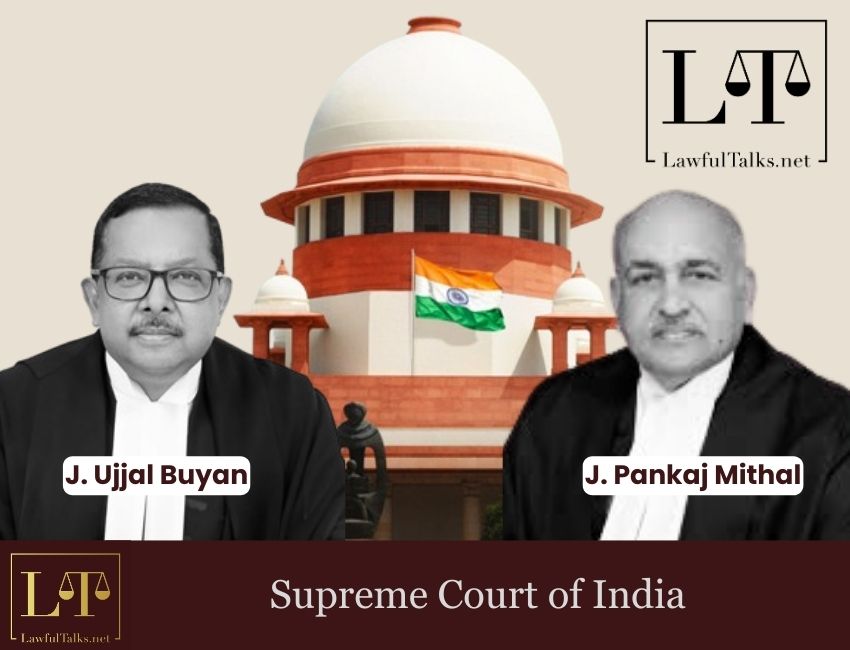Allahabad HC Sets Aside Afzal Ansari's Conviction, Allows Him to Continue as MP

The Supreme Court division bench comprising Justice PANKAJ MITHAL and Justice UJJAL BHUYAN held that Refusal to marry in a relationship does not amount to criminal liability for abetment of suicide.
“To convict a person for abetment of suicide under Section 306 IPC, there has to be a clear mens rea on the part of the accused to abet such a crime and it requires an active act or a direct act leading to the commission of suicide."

The accused, Kamruddin Dastagir Sanadi, was initially acquitted by the Trial Court of charges under Sections 417 (Cheating), 376 (Rape), and 306 (Abetment of Suicide) IPC. The deceased, Suvarna, consumed poison after the accused refused to marry her. The Trial Court found no evidence of instigation or a physical relationship and acquitted the accused. However, the High Court convicted him under Sections 417 and 306 IPC, sentencing him to 1 year and 4 years of imprisonment.
The Court found that the prosecution failed to provide any evidence of a promise to marry or any physical relationship between the deceased and the accused. There were no call records or other tangible evidence to support the claim that the accused and the deceased were in regular contact or that they were romantically involved. The allegations were not corroborated by the testimony of the witnesses or by the dying declarations.
The Court then considered Section 306 IPC, which defines abetment of suicide, and emphasized that “abetment” requires the accused to either instigate, aid, or engage in a conspiracy to commit the suicide.
The Court reiterated that for a conviction under Section 306 IPC, there must be evidence of instigation or active participation by the accused in prompting the victim to take their life.
Referring to previous judgments, including Ramesh Kumar v. State of Chhattisgarh and M. Mohan v. State, the Court reiterated that emotional distress, such as a broken relationship, does not automatically equate to instigation.
The Court also referred to the case Prabhu v. State to emphasize that the breaking up of a relationship, while painful, does not constitute abetment unless there is clear evidence that the accused actively instigated the suicide.
"Abetment involves a mental process of instigating a person or intentionally aiding a person in doing a thing. Without a positive act on the part of the accused to instigate or aid in committing suicide, conviction cannot be sustained."
The Court held that in this case, the accused merely refused to marry Suvarna, which, even assuming there was love involved, is a mere case of a broken relationship, not instigation to suicide.
"A broken relationship, even if emotional, does not amount to instigation or abetment of suicide unless there is clear evidence of the accused’s active involvement in prompting the act."
The Court further concluded that the deceased had carried the poison with her to Kakati with a pre-determined intention to either secure the accused’s commitment to marry her or end her life if he refused. The refusal to marry did not constitute instigation for suicide, and there was no evidence that the accused had provoked her in any way.
"Even assuming, though there is no evidence that the accused-appellant promised to marry the deceased, that there was such a promise, it is again a simple case of a broken relationship for which there is a different cause of action, but not prosecution or conviction for an offence under Section 306."
The Court ultimately ruled that the evidence presented did not support the conviction of the accused under Section 306 IPC. The judgment of the High Court convicting the accused was set aside, and the accused was acquitted by the Supreme Court.
Case Details: Kamaruddin Dastagir Sanadi v. State of Kerala, Crl. Appeal No. 551 of 2012

Sonam Pandey
Law Student
Latest Posts
Categories
- International News 19 Posts
- Supreme Court 352 Posts
- High Courts 366 Posts




























































































































































































































































































































































































































































































































































































































































































































































